Tag: COVID
COVID Campus Updates
by The Cowl Editor on March 18, 2021
Campus

by Kyle Burgess ’21
News Co-Editor
With the arrival of spring comes a renewed sense of hope and excitement in the Friar community. On March 6, a school-wide email from Dean and Vice President of Student Affairs Steven Sears announced that a gradual return to normalcy would be coming in the next few weeks. Some of the major changes that the email highlighted were outdoor and in-person meetings for clubs, the re-opening of club offices and McPhail’s for seniors who are 21 and older, and even hosting school-wide events like a spring concert and Clam Jam.
Another ground-breaking change that students can expect this semester is the ability to remain on campus during Easter break. Typically, such privileges are allotted to student athletes or students who need to travel great distances to return home, but this option has now been offered to all students who wish to remain on campus. Meals will continue to be provided on campus for such students and facilities such as Concannon Fitness Center will remain open for their use as well. Additionally, Friars who stay on campus are welcome to attend Triduum liturgies and take part in Easter festivities. Regular testing and social-distancing protocols will remain in effect during this time.
For those students who plan on leaving campus, the College has asked that they share their break plans via the Google form linked in the recent Continuity email regarding Easter break. The College has also encouraged students traveling to limit contact with others over break for the safety of their roommates and the larger PC community.
Lastly, the College has shared their intentions of holding an in-person commencement ceremony for the class of 2021. While this ceremony will not take place at the Dunkin’ Donuts Center, the traditional ceremony site for graduating Friars, an alternative location is to be revealed at some point. Such developments are in line with previous statements made by commencement ceremony planners on Facebook and elsewhere as the College anticipates celebrating the hard work and achievements of both the classes of 2020 and 2021.
Featured Friar: Abby Kiernan ’21
by The Cowl Editor on March 18, 2021
Features
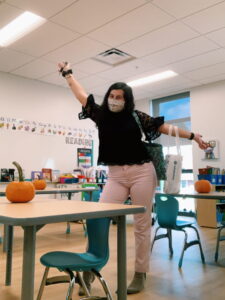
by Kyle Burgess ’21
News Co-Editor
As the world acknowledges the one-year anniversary of a life in lockdown due to the COVID-19 pandemic, many have considered the past 12 months as a time for isolation and removal from group settings to ensure the safety of others. However, social-distancing measures have not prevented many members of the Providence College community from continuing to make impacts on the lives of others around them. Such is the case for Abby Kiernan ’21, who strives to make a positive impact both on the children she educates as a student teacher and on her residents as head resident assistant of Meagher Hall.
Kiernan’s path to PC began when she was in high school in Brockton, MA. As a member of her school’s choir, she became friendly with the choir director, a PC alumnus, who suggested that Friartown would be a perfect fit for her. “My freshman year, [my] choir director said to me, ‘You are definitely a future Friar,’” Kiernan explained. “As senior year approached, I decided to apply to Providence because I knew how excited Mr. Cunningham would be to write a recommendation.” One campus tour on accepted students’ day was all it took to convince Kiernan that her choir director was right all along.
In the years since her first visit to PC, Kiernan has kept herself busy between her involvement in the Office of Residence Life and student teaching. In particular, the challenges that COVID-19 restrictions have presented for resident assistants on campus has been a real learning curve. “Everything I learned last year about being an RA I had to relearn during the pandemic in a more demanding and higher leadership position as an HRA,” she said. “Not only do I support the community on my floor, but also amongst my staff and the entire Residence Life staff. Because of the many COVID-19 guidelines and policies at Providence College this year, I have had to learn many different ways to build community but also to support my residents in these difficult times.”
Despite this, Kiernan embraced her new role with open arms and feels that her student teaching background has certainly helped her adjust. “Because of my teaching background, I am usually pretty good with names and love to stop and chat in the hallway. Being there for others and filling others’ buckets are what makes my heart happy!”
Kiernan is also thankful for the opportunity to attain her dream of becoming a teacher despite the new challenging classroom environments created by the pandemic. Following in her mother’s footsteps, becoming a teacher has been Kiernan’s goal since she was young. She believes that teaching in person and virtually for students at school while studying remotely has demonstrated the importance of being resilient and being able to think on her feet. “Not only have I been dealing with being a college senior during a pandemic, but I have also been supporting a diverse group of elementary-age students with many different needs during this time. Student teaching is a time for me to learn how to take over and manage a classroom with the help of my supervisor and cooperating teacher. This experience has been unique in the fact that all of us are learning how to teach during the pandemic.”
Looking ahead beyond graduation in May, Kiernan will work as a graduate assistant while pursuing a master’s degree in urban teaching. She hopes to eventually return to her hometown to work within the Brockton public school system as a teacher and potentially work in Boston afterwards. No matter where Kiernan’s career takes her, she will always be thankful for the opportunity to change the lives of others while at PC, even from six feet away.
Attempting to Get Vaccines and Stimulus Checks for All: Biden Administration Plans on Rapid COVID Relief
by The Cowl Editor on March 18, 2021
National and Global News
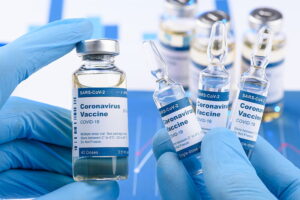
by Sydney Olinger ’23
News Staff
March 11 marks the one-year anniversary of the nationwide shutdown that was enacted due to the rapid spread of COVID-19. A year ago today, no one could have predicted that our country would still have increasing cases and harsh COVID-19 regulations. In his first prime-time address to American citizens, given on this one-year anniversary, President Joseph Biden announced that he will direct states to make all adults vaccine-eligible by May 1.
This directive will hopefully mark the start of our country’s return to normalcy, but Biden noted that not all adults will be vaccinated by May 1. Therefore, some COVID-19 regulations, such as mask-wearing and not gathering in large crowds, need to be maintained.
The federal government is in control of distributing the vaccine to each state, but states are given discretion in deciding who is eligible. Most states have been consistent in deciding who receives priority for the vaccine, but some have different guidelines for which groups are eligible first. According to Biden, all adults should be able to get in line for their first dose of the vaccine by May 1, as long as the country has enough doses and rollout goes successfully.
On the same day as this prime-time address, Biden signed a $1.9 trillion COVID-19 relief package into law. The intent of this bill is ultimately to help Americans who are struggling financially. The bill also aims to stimulate an American economy that has been facing major challenges for the last year, as countless businesses have shut down or reduced capacity in order to limit the spread of the virus.
Biden’s plans for returning the country to some semblance of normalcy offered a sense of hope to many people and businesses in the country. With the increased distribution of vaccines to all adults willing to get the vaccine, Biden hopes that we will be able to have as close to a normal Fourth of July that we possibly can. “By July the Fourth, there’s a good chance you, your families and friends, will be able to get together in your backyard or in your neighborhood and have a cookout or a barbecue and celebrate Independence Day,” said Biden.
Despite the fact that Biden hopes we will be able to enjoy a fairly normal holiday, he is still encouraging people to not gather in large crowds. As vaccine rollouts progress in the coming weeks, the CDC will also update guidelines regarding travel, work, and gatherings. Depending on the number of cases as well as deaths, the first holiday we should be able to celebrate fully with people outside of immediate households will be Independence Day. “After this long hard year. . . [we] will make this Independence Day something truly special where we not only mark our independence as a nation but begin to mark our independence from this virus,” stated Biden. Though we should remain hopeful that we will return to a sense of normalcy soon, we must also continue to follow the safety guidelines set by the CDC.
Biden also asked Americans to do their part to help the country make it to the other side of the pandemic. “A lot can happen,” Biden said. “Conditions can change. The scientists have made clear that things may get worse again. As new variants of the virus spread, we’ve got work to do to ensure that everyone has confidence in the safety and effectiveness of all three vaccines.” Throughout his speech, Biden expressed empathy and compassion for the lives lost during the pandemic both within our country and across the world, while also offering hope to the nation that we will overcome the virus and all of the pain it has brought.
COVID Cases Begin to Fall Following Campus Outbreak: Situation Temporarily Looking up for the Ocean State
by The Cowl Editor on March 4, 2021
Campus
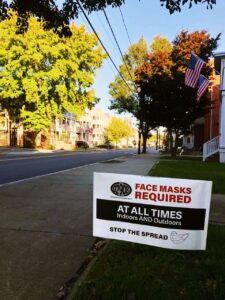
by Hannah Langley ’21
News Co-Editor
For almost a year, COVID-19 has affected everyone in a variety of ways. Although the virus is still very much present, cases in Rhode Island have been dropping in recent weeks as more people are getting vaccinated. Cases at Providence College have also been dropping, which is a good sign moving forward in this semester.
Over the past several months, nearly 300,000 doses of the vaccine have been administered in Rhode Island. The percentage of positive cases in the state has also been steadily declining, dropping from a positivity rate of 7.4 percent to 2.1 percent currently.
Government officials in Rhode Island are divided on whether the vaccine rollout is going smoothly or not. Governor Gina Raimondo argues that their strategy has been going well, targeting the state’s most vulnerable populations first and now transitioning to broader immunization. “The overall picture, as it relates to us, is that we’re in a good and stable place.”
Lieutenant Governor Dan McKee disagrees, however, saying, “Like most Rhode Islanders, I am not satisfied with the current administration’s progress on vaccine distribution, especially as we see our neighbors in Connecticut ranked among the top in the nation.” Vaccine rollout will continue under the direction of McKee following Raimondo’s departure to Washington, D.C., where she will be assuming the position of commerce secretary.
The PC community has also seen some success in recent weeks in combating the spread. During the week of Feb. 4, the College experienced a small outbreak with around 130 cases in a matter of five days. This forced the administration to set up temporary measures around campus, such as restricting non-essential travel, closing club offices, and making only to-go dining options available.
This past week, however, cases have been steadily decreasing, with only three positive cases reported on Thursday, Feb. 25 and five positive cases reported last Friday, Feb. 26.
On Friday, the Continuity Task Force sent an email listing a number of lifted restrictions, including the opening of in-person dining on campus; the ability to begin student teaching, practicums, and other placements again; extension of the Concannon Fitness Center’s hours; and 40 percent capacity of St. Dominic Chapel.
“Our sincerest hope is that this is just the beginning of our transition toward more opportunities for our students—and others in our community—to better enjoy more of the wonderful aspects of life on a campus,” stated the email. “The College is committed to trying to create more opportunities for socialization and collaboration, but the first responsibility is for health and safety. Our best bet is to redouble our collective commitment to doing all the things that we know are effective—especially avoiding large gatherings—so that our COVID-19 cases continue to decline.”
Dean Steven Sears, vice president for student affairs and dean of students, also sent an email that night, reiterating the email sent by the task force earlier. Sears’ email included the prospect of many other positive changes that could be occurring on-campus in the coming weeks, including attendance at outdoor sports games, visitation at other residence halls, more intramural opportunities, and the reopening of McPhail’s.
While these are just goals for what is to come during the remainder of this semester if case positivity rates remain low, it was a hopeful message to the PC community.
Rhode Island Recovery Effort Experiences Growing Pains: Citizens Become Frustrated With Vaccine Dispersal
by The Cowl Editor on February 25, 2021
Campus

by Max Waite ’21
News Staff
As of Feb. 22, eligibility for the COVID-19 vaccine has expanded in Rhode Island to those who are 65 and older. Though this age group is now eligible, it has already proven to be difficult to book vaccination appointments at various testing centers and pharmacies like CVS and Walgreens. Appointments are quickly being booked extending into the immediate future as more groups are becoming eligible for the vaccine, and citizens have expressed their frustrations with the online format’s technical issues.
Approximately 9,900 citizens were vaccinated across both state-run testing facilities during the first three days of operation. Over the past six weeks, the vaccine administration rate has increased by 89 percent in Rhode Island, with more than 211,000 doses of the COVID-19 vaccine having been administered to date.
Overall, the state has seen a steady decline in new cases and hospitalizations. Field hospitals in Providence and Cranston will be taken out of service, as Rhode Island has seen a 47 percent decline in hospital admissions since last month. The Rhode Island Convention Center will have its last day of patient care on Friday, Feb. 26, and Cranston’s site is scheduled to shut down within the next couple of weeks. On another note, Rhode Island has placed New Hampshire back on the state travel advisory list, along with Louisiana.
In the past seven days, Rhode Island reported the most COVID-19 deaths as a percentage of its population in the country. For the past year, the state has had the fourth-highest COVID-19 death rate in the country, behind New York, New Jersey, and Massachusetts. Six percent of the population in Rhode Island has been fully vaccinated.
For Providence College students, the routine of weekly testing remains the same. Over the past week, the number of positive test results at the PC testing center has significantly declined. On Feb. 18, Rhode Island reported a 1.72 percent COVID-19 positivity rate, with an average of 2.2 percent over the course of that week. Though eligibility for vaccinations is expanding across the state, the College continues to urge students to remain conscientious of social distancing guidelines, having students remain in their pods and encouraging them to only leave for essential purposes. There have been concerns regarding the continuation of large gatherings off campus, and if the positive numbers increase significantly again, there may be trouble ahead in Friartown. In the meantime, as vaccination efforts continue to progress, it is best for everyone to continue to do whatever they can to stop the spread of the virus.
Making a Worthwhile Investment: PC Provides Grants for COVID-19 Research
by The Cowl Editor on February 25, 2021
Campus
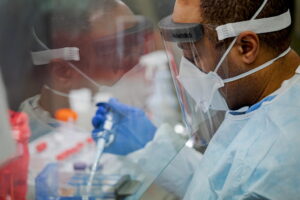
Photo courtesy of Flickr.com.
by Sydney Olinger ’23 and Kyle Burgess ’21
News Staff
Nearly a year after the first string of international lockdowns due to the COVID-19 pandemic, the race to find the most effective and obtainable vaccine for the novel coronavirus continues to heat up. Major pharmaceutical giants such as Pfizer, AstraZeneca, and Moderna have each developed their own respective vaccines and have seen their wares distributed across the United States and Europe. Although the finish line for herd immunity appears to be in sight, much work remains in helping to understand the medical, economic, and social consequences of this historic moment.
Here at Providence College, five faculty members have taken it upon themselves to assist in answering these questions with their own research projects. Each of them has received short-term research grants from the College’s Office of Sponsored Projects and Research Compliance totaling $10,000 in funding with support from the Rhode Island IDeA Network of Biomedical Research Excellence.
Dr. Kris Monahan, director of SPaRC, explained how PC wanted to provide an opportunity for both faculty and students to make the most out of the current situation in conducting research.
“A strategic decision was made in consultation with the SPaRC advisory committee that the best way to support faculty scholarly work this year was to provide direct support to faculty who wanted to work with students to explore, understand, and develop solutions related to the COVID-19 pandemic,” said Monahan. “While we don’t expect to be positioned to always make direct grants, we are pleased that we were able to fund these pilot projects.”
Some of their findings have already begun making headlines in the battle to contain the virus’s spread. Father Nicanor Austriaco, O.P., of the biology department, for example, has been spending his sabbatical leave at the University of Santo Tomas in the Philippines developing a yeast-based COVID-19 vaccine. He was inspired by the plight of many Filipinos who were unable to obtain Western vaccines due to their socioeconomic status. Unlike the vaccines produced by many leading pharmaceutical companies, Fr. Austriaco’s vaccine would not need to be stored at lower temperatures and could be dispersed at little to no cost for potential recipients. “The poor are [the] beloved of the Lord,” he explained. “We should make COVID-19 vaccines available to them at no cost. This is both the ethical thing to do, because we should provide for those in need, and the scientific thing to do, because the poor often live in densely populated areas that tend to harbor the virus.”
Meanwhile, Dr. Fang Dong, associate professor of economics, is hoping to comprehend the economic fallout from the pandemic. More specifically, she aims to discover the interrelatedness between unemployment rates, COVID-19 cases, and stringency/movement restrictions indexes. With the College’s financial backing, Dong has been able to hire two research assistants from the economics department to collect data across the globe on variables such as gross domestic product and unemployment in 2020. “There are so many colleagues who had already been or are also working either solely or collaboratively on COVID-related research projects and I am just lucky to receive the grant,” she explained.
For some communities, the consequences of the COVID-19 pandemic have only compounded previous natural and economic disasters. Dr. Jessica Mulligan of the health policy and management department, along with the help of five student researchers, is looking at the experiences of healthcare workers in Puerto Rico as the island continues to reel from the effects of Hurricane Maria, which hit in 2017. The team aims to identify the ethics of care styles circulating among healthcare workers during COVID-19, develop dialogues with healthcare workers working after what they call “compounding disasters,” and establish policy recommendations to improve working conditions within the U.S. territory.
Elementary and special education professors Dr. Marci Zipke and Dr. Lori Dunn are using the College’s generous financial grant to investigate how pre-service teachers can best prepare themselves and their students for learning during the pandemic. “We have administered a survey to the undergraduate pre-service teachers who took methods courses last semester in order to explore best practices,” said Zipke. “We suspect that a combination of synchronous meetings and asynchronous assignments, with flexibility and judicious use of technological tools is most effective for course work, and that virtual field experiences have clear benefits in terms of the students’ perception of their preparedness for teaching, but we are still analyzing the data and holding focus groups.” Both Zipke and Dunn believe that their research will help teachers learn which course designs, technological tools, and field component formats will work best in the virtual classroom as social-distancing measures continue to keep schools closed.
With the help of these grants, the Friar Family is beginning to unravel some of the complex and multifaceted consequences caused by the COVID-19 pandemic.
Road to Recovery Hits Speed Bump: COVID Concerns Rise as PC Experiences Spike
by The Cowl Editor on February 11, 2021
Campus

by Eileen Cooney ’23
News Staff
A dip in the number of reported coronavirus cases across the country in recent days has compelled some states, including Rhode Island and Massachusetts, to ease up some restrictions. Rhode Island recently lifted its curfew for restaurants and bars, and Massachusetts announced a plan to allow restaurants and other indoor businesses to operate at higher capacity.
Additionally, Rhode Island has announced the closure of the Dunkin’ Donuts Center testing site and its transformation into a state-run vaccination site. This is part of the state’s efforts to ramp up vaccinations and to move the process along so that a majority of its population can get vaccinated.
On campus, however, the number of reported COVID-19 cases among Providence College students has remained high over the past few days. As of Feb. 3, there are 89 students in isolation and 121 students in quarantine. As of Feb. 9, PC’s positivity rate is 2.27 which is slightly below the Rhode Island state positivity rate of 2.7%. While the number of students testing positive looks higher this semester compared to last, an email from the College’s continuity task force sent out last Wednesday stressed the need to take this data seriously.
This semester, students are being tested much more frequently, and we are in an environment where the virus is much more widespread in the surrounding community.
Additionally, a number of the positive cases reported each day are from students who are already in quarantine as close contacts. Clearly, this subset of individuals is a group that has a higher probability of testing positive due to their status as close contacts, and most of these individuals had already been removed from the population by the time of their test.
Despite this relatively positive news, the College is still warning students to remain vigilant. The Office of Public Safety and Community Standards sent out an email on Feb. 6 warning students that they were aware of the reported behavior in violation of the student code of conduct that seems to be exacerbating the spread of the virus. Public Safety again warned students of the consequences of their actions. Public Safety’s concerns are certainly not unfounded—on February 8 and 9, PC reported 34 and 33 new cases, respectively.
The College also announced its plan to test students twice weekly instead of just once. The effects of this plan remain to be seen in the coming weeks.
Despite this, PC students remain resilient and determined to make the most of this rather strange semester. This winter, the College’s Office of Student Activities invested in fire pits to be placed on Slavin lawn. The fire pits seat up to six people and can be reserved for one-hour time blocks on Friday, Saturday, and Sunday nights from 4 p.m.–midnight. Students can reserve them with their pods to safely and warmly enjoy a nice meal or banter session with friends.
On Friday and Saturday nights, students can be seen gathered around the fires with masks on, grateful for the opportunity to be on this beautiful campus. Additionally, the Office of Student Activities has reserved food trucks for every weekend this semester. Last weekend featured Ming’s Asian Street Food truck. These have been a major hit among students.
Gracie Cleaver ’23 says, “I love the new food truck Fridays. They are a great and safe way to get out of your dorm and enjoy some good food with friends. I’m really happy and appreciative that the College has invested so much time, money, and thought into resources for students during this very difficult time.” Although this semester has seen an unprecedented number of changes to daily life for students, the College’s commitment to its students’ well-being remains strong. The College is working hard and will need the support of the student body to avoid the same kind of outbreak that put a pause on the fall semester.
Helping to Turn the Tide: First COVID-19 Vaccinations Flood Ocean State
by The Cowl Editor on February 4, 2021
Campus
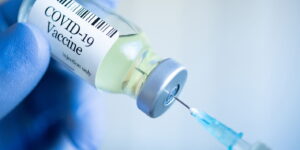
by Eileen Cooney ’23
News Staff
On Feb. 1, Rhode Island reported a 2.7 percent COVID-19 positivity rate, its lowest since October, with 158 new cases and 13 fatalities. The decrease in the positivity rate is due to a combination of factors, but many health officials are pointing to the nearly 77,000 first doses of the vaccine that have been administered so far, and the 28,000 people in Rhode Island who have been fully vaccinated.
Rhode Island, like all states currently, is seeking to ramp up its vaccination efforts in hopes of stemming the winter surge and combatting new variants of the virus that are causing alarm.
On Jan. 28, state health officials announced the next phases of the state’s vaccination plan, which allows those who are 65 and older to be vaccinated starting in mid-February. As of now, there are only limited vaccinations available for those above the age of 75. Rhode Island first made vaccinations available to health-care workers, first responders, and nursing home and assisted living facility residents and staff.
Dr. Nicole Alexander-Scott, Rhode Island’s Department of Health director, has said that the next upcoming phase will involve all Rhode Islanders over the age of 16 who have underlying health conditions, are immunocompromised, or are pregnant. This next phase is also unique in that it would involve distributing vaccines at a quicker pace in those towns where there are a disproportionate number of hospitalizations due to the virus, Alexander-Scott has said in press conferences.
She states that, currently, the state is dealing with a limited supply of the vaccine, but that “the aims of this next phase are to protect those most at risk for hospitalizations and death from COVID-19.”
In neighboring states like Massachusetts, the vaccine roll-out has not been as well-received by residents. Massachusetts Senator Eric Lesser said on Jan. 28 that “the Phase 2 vaccine rollout is creating mass confusion and anxiety for our eligible senior population. The system is cumbersome, contradictory, and asks residents over 75 to navigate a haze of web links, locations, and instructions, each with different criteria and scheduling systems.” In response to criticism, Massachusetts Governor Charlie Baker urged all to be patient with the process until a steadier, more stable supply of doses is obtained from the federal government. The governor also said that his administration was working to create more resources to help those who are older and having difficulty trying to navigate the sign-up process.
News of increased vaccinations offers Rhode Islanders and those in neighboring states slight glimmers of hope during what has been a disastrous winter for the state and the country as a whole. New coronavirus variants that were first identified in South Africa and the United Kingdom have been found to be more contagious, and now there is preliminary evidence suggesting they could even increase mortality. On Jan. 29, Johnson & Johnson released data revealing that their one-dose vaccine is 66 percent effective against moderate and severe disease, but this hopeful measure was overshadowed by other data, suggesting the vaccine could be less effective against these new variants. Shares of Johnson & Johnson fell on Friday as investors were hoping for an efficacy number above 80 percent. In response to this pessimism among some, John Brooks, a chief medical officer at the CDC, said that “any vaccine is better than no vaccine.”
In the meantime, Providence College students find themselves going through the motions of weekly testing and social distancing measures following their return to campus for the spring semester. After observing an initial “quiet period” in which students were required to stay in their on or off-campus housing locations, with exceptions given for traveling to class and work, shopping for groceries and receiving grab-and-go meals from Raymond Dining Hall, and participating in outdoor exercise with a student’s own pod, the hope amongst many students is that recent developments on the vaccine front will help alleviate stress and restrictions on the PC community. Time will tell just how successful these recent vaccination efforts have been.
Mid-Pandemic, PC Has Reopened: What Happens Next Is up to Us
by The Cowl Editor on September 3, 2020
Editorials
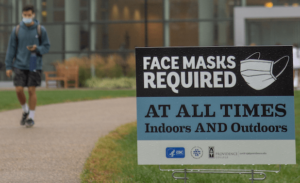
by The Cowl Editorial Board, 2020-2021
Friars hold doors is a refrain commonly heard on the Providence College campus. Obviously, and as so many of us know from experience, it refers to the way that members of the PC community always seem so eager to hold the door for one another, even if it means standing there for an awkward amount of time while the person behind runs up to grab the door.
As cliché as it sometimes sounds, in a more serious sense, Friars hold doors speaks to the way that members of this community are always ready to lend a helping hand in a time of need. It speaks to the doors that this institution opens for its students and the doors that students are always opening for one another. At its core, Friars hold doors speaks to the spirit of community here at PC—to the love we have for one another and the obligation we feel towards each other as members of the Friar Family.
Now more than ever, we students must recommit ourselves to this community and this family.
For the past six months, teams of administrators, professors, staff members, and a number of students have worked tirelessly to put together a reopening plan for the College. On Aug. 31, after months of deliberation on if, when, and how we could operate in-person, PC reopened mid-pandemic and officially began a school year unlike any other in the College’s 103-year history.
With this opening, the baton has been passed. Now, the fate of the school year rests almost entirely in students’ hands. The actions that we as a student body take—or choose not to take—in the coming weeks will determine what lies ahead not just for this academic year, but also for the College as a whole and for the Providence community at large, perhaps even for years to come.
With this extraordinary responsibility placed in our hands, we now must all work together in pursuit of one common goal: keep Providence College open. We have the ability to rise to the occasion, meet this challenge, and accomplish this goal. But it is going to take all of us, and it is going to take sacrifice.
The enormity of this task is hard to grasp, especially because it is such an emotionally-charged one. Each person in our community is experiencing some kind of anxiety or grief right now, whether it be over the loss of a senior year, the isolation of being quarantined as a freshman in a new place, the loss of a job or family home, or, worst of all, the loss of a friend or family member. Regardless of individual circumstance, each of us in the student body is missing out on the college experience we expected and hoped to have this semester. It is not easy to come to terms with that disappointment or with the accompanying uncertainty.
While we need to come together first and foremost to ensure the physical health of everyone in our community, it is equally important that we unite to support one another in a mental health and emotional wellbeing capacity, as well. We must continue to show up for one another.
But if we were to separate ourselves for just one moment from the emotional complexity of these times, our charge comes down to this: we have a series of decisions to make in the coming weeks about what actions and activities we will engage in. And with every decision to be made, there is an accompanying list of pros and cons.
In the end, it is abundantly clear that what we stand to gain by following guidelines is so much greater than what we could gain from two weekends of partying. Even more so, what we stand to lose if we do not follow guidelines is far, far greater than what we lose by choosing not to go to that Eaton Street party.
The negative consequences are clear: there have already been 17 suspensions of students, and there is a looming threat not just of individual punishments, but of the entire campus potentially having to revert once again to completely remote learning. But far and away, the most devastating and dangerous negative consequence that could result from our failure as students would be to our collective physical health. Here, the consequences reach far beyond just the student body.
We must think not just of all the students living in close quarters who are likely to get sick. We must also keep in mind the staff and faculty members on our campus who go home to their families at the end of the day—people who might be bringing the virus home to young children, elderly parents, or immunocompromised family members. We must be mindful of our surrounding community: our local Providence neighbors, the people we live next to, who shop at the same grocery stores or ride the same buses as us.
The most dangerous outcome—an outbreak—would have far-reaching and devastating effects. We must remember that as a campus, we are part of a wider community, and we need to act accordingly.
But fear of the negative consequences should not be the only driving force behind our actions. We should also be motivated by the positive outcomes if we work together and follow the rules: the health and safety of our community, the chance to stay on campus this semester, the potential of a more ‘normal’-looking spring, a slow but steady reopening that enables us to get back to the College we know and love. If we can just stick it out, if we can make short-term sacrifices for long-term success, the potential for these positive outcomes could become a reality.
The questions we must ask ourselves, then, are not just the practical ones, like what is next for us, or what actions we need to take in the coming weeks. As PC students, we have been trained to ask the tough questions, too. We must ask ourselves: what do we owe our fellow students? What do we owe our teachers, our administrators? What do we owe the members of our community off-campus?
Now, we are called not just to ask these questions, but to answer them through our actions and choices in the coming weeks.
Rising to meet this challenge—one unlike any the College has ever seen—is not just our responsibility as students. It is an opportunity for us to prove to those around us now and those who will look back on our generation in the years to come that in the face of uncertainty and fear, our commitment to each other as members of the Friar Family is what kept us safe, saw us through, and gave us hope.
